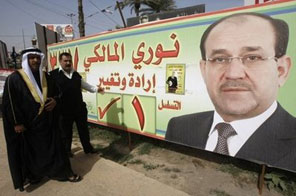Iraqis vote in crunch test for fledgling democracy
AGHDAD: Iraqis on Sunday will cast ballots in their war-shattered nation's second parliamentary election since the US-led overthrow of dictator Saddam Hussein, a vote that Al-Qaeda has threatened to sabotage.
Amid tight security, Sunni Arabs are expected to turn out in force at voting centres, in stark contrast to 2005 when they boycotted nationwide polls in protest at the rise to power of the nation's long-oppressed Shiite majority.
That boycott deepened the sectarian divide and heightened unrest which killed tens of thousands of Iraqis in the aftermath of the 2003 invasion and which has only eased in the past two years.
The election will usher in a government tasked with tackling a multitude of problems, including still high levels of violence, an economy in tatters and state ministries mired in a culture of endemic corruption.
Seven years after the war, much of Baghdad remains bomb damaged, most homes receive only a few hours of mains electricity a day and lack clean drinking water, and a quarter of the Iraqi population is illiterate.
Northern Iraq's autonomous Kurdish region, which is almost free of violent attacks and whose economy is booming, is one of the country's few bright spots.
Iraq has vast oil deposits and in recent months has signed 10 massive deals with foreign companies, but income will take years to flow into government coffers and for the moment much of the population remains poor.
The United States hopes the election will bolster Iraq's fledgling democracy, make it a beacon in a region where free and fair elections are the exception, and pave the way to a smooth pullout of American troops.
Prime Minister Nuri al-Maliki, the Shiite head of the State of Law Alliance, is bidding to become the first Iraqi voted back into office at the will of the people who for decades had no choice but Saddam's Baath Party.
Maliki, 59, who heads a religious coalition with a secular outlook that includes several Sunni tribal sheikhs, on Wednesday said he was "certain" of poll victory.
But he is facing stiff competition.
His rivals include Iyad Allawi, a Shiite former prime minister who heads the Iraqiya list, a rival secular coalition that has strong support in Sunni areas.
Also seeking the top job are Ahmed Chalabi, a former deputy premier once favoured but now loathed by Washington; Adel Abdel Mahdi, the country's Shiite vice president; and Baqer Jaber Solagh, the finance minister.
Chalabi, Mahdi and Solagh all represent the Iraq National Alliance, the main Shiite religious list.
Under the Iraqi electoral system no one party will emerge with the 163 seats needed to form a government on their own and the ensuing horse-trading to form a governing coalition could take months.
The vote is seen as a pivotal test of democracy less than six months before US combat troops quit the country ahead of a complete withdrawal from Iraq by the end of 2011.
So far, 4,380 American soldiers have died since the invasion, according to an AFP tally based on the independent website icasualties.org.
Iraq Body Count, a Britain-based group, estimates that between 95,000 and 104,000 civilians have been killed in the same period.
Although violence is at a post-invasion low, attacks occur almost daily in Baghdad and other hotspots, such as the restive northern city of Mosul. More than 350 people died in unrest last month.
The Iraqi capital has seen four major attacks in the past six months -- three of them targeting government buildings -- that killed more than 400 people and dented Maliki's reputation as a guardian of security.
A massive security operation is in place for Sunday's voting, with 200,000 police and soldiers in Baghdad alone.
Al-Qaeda in Iraq in a statement on Friday threatened to kill voters, days after a series of suicide attacks and bombings killed dozens.
The Islamic State of Iraq, the Qaeda front in the country, said it was imposing a "curfew" on Sunday and anyone who dared defy it would "expose himself to the anger of Allah and ... all kinds of weapons of the mujahedeen."
The US military has insisted that Iraq's security forces are in command but American troops will be on standby.






